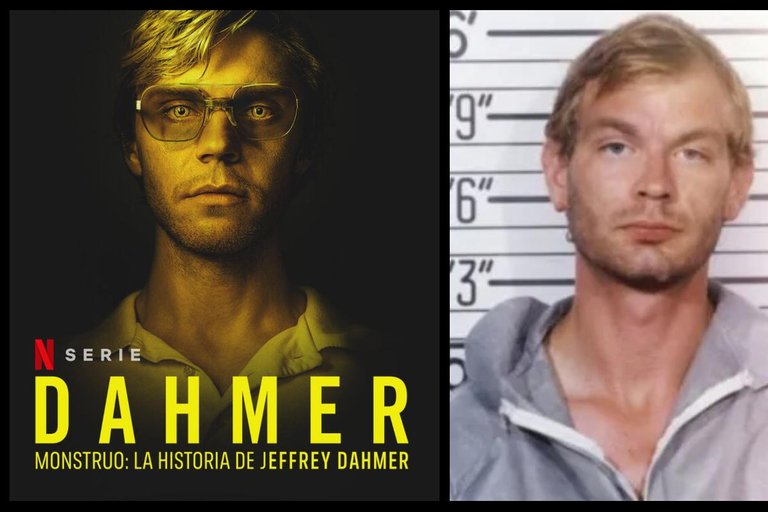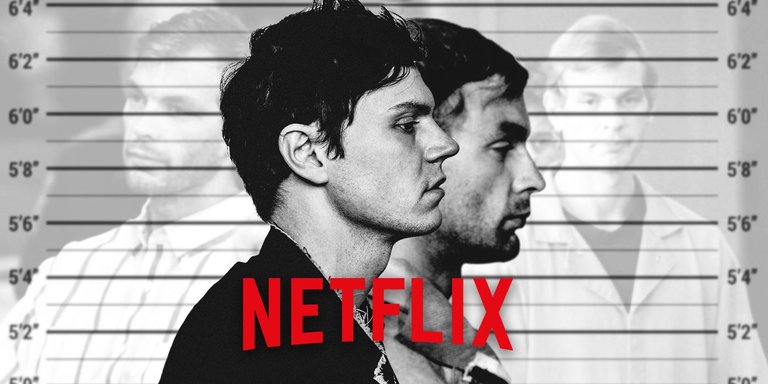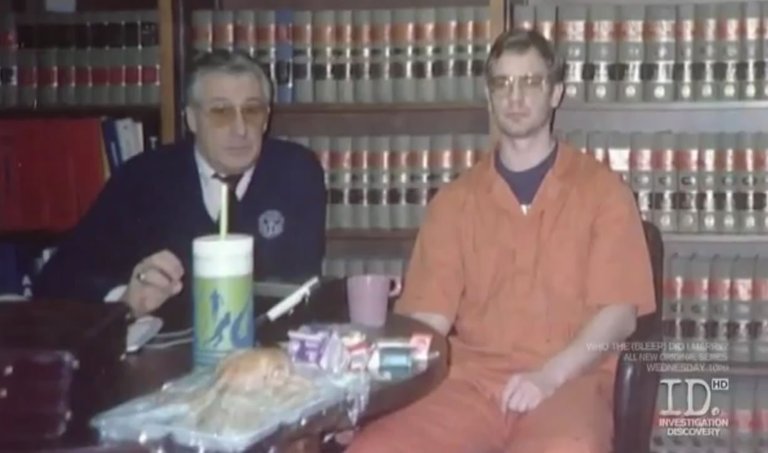A Criminal Case: Why Jeffrey Dahmer Became A Serial Killer and Cannibal? [ENG/ESP]


Park Dietz, a veteran forensic psychiatrist, in multiple books (including John Douglas' "Mind Hunter" and Robert Ressler's "He Who Fights Monsters") has been adamant about the minds of serial killers; but specifically about Jeffrey Dahmer, he has stated that from his analytical perspective, the underlying motivation of the so-called "Milwaukee Butcher" was always the same: total control over his victims. Moreover, from Dietz's perspective, Dahmer was anything but mentally ill. According to the author and doctor, he could perfectly well recognise right from wrong, and knowingly choose to do what he did (and which is the plot of this post). He is therefore guilty and perfectly fit to face the consequences of his actions.
However, this is where the key question arises in all of this: What constitutes the benchmark for being unequivocally diagnosed as "mentally ill"? To answer this, it is clearly not enough to murder on multiple occasions, dismember bodies without flinching, eat parts of the victims, store and preserve them, both in the refrigerator and in polyethylene barrels (which is a resistant material for hydrofluoric acid. Used to dissolve and undo almost anything); fornicate with corpses to orgasm; and finally drill the skulls of the unfortunate people who fell for Dahmer's "tricks" of seduction, with the aim of "making them docile. Useful zombies who would be able to take the initiative and thus reject him".
Park Dietz, un veterano psiquiatra forense, en múltiples libros (incluídos, "Mind Hunter" de John Douglas y "El que lucha con monstruos" de Robert Ressler) ha sido categórico acerca de la mente de asesinos seriales; pero concretamente sobre Jeffrey Dahmer, ha declaro que desde su óptica y criterio analítico la motivación subyacente del conocido como "Carnicero de Milwaukee" siempre fue la misma: control total sobre sus víctimas. Además que, desde la perspectiva de Dietz, Dahmer era cualquier otra cosa menos un enfermo mental. Según el autor y doctor, éste podía reconocer perfectamente el bien del mal, y a sabiendas de esto eligió hacer lo que hizo (y que es la trama de este post). Por tanto, es culpable y perfectamente apto para enfrentar las consecuencias de sus actos.
Sin embargo, aquí es donde surge la pregunta clave de todo esto ¿Qué constituye como parámetro para poder ser diagnosticado, inequívocamente como "enfermo mental"? Para responder esto, claramente no basta con asesinar en múltiples ocasiones, desmembrar cuerpos sin inmutarse, comer partes de las víctimas; guardarlas y preservarlas, tanto en el refrigerador como en barriles de polietileno, (que, es un material resistente para el ácido fluorhídrico. Empleado para disolver y deshacer casi cualquier cosa) fornicar con cadáveres hasta alcanzar el orgasmo, y finalmente taladrar los cráneos de las infortunadas personas que cayeron bajo los "trucos" de seducción de Dahmer, con el objetivo de "volverlos dóciles. Zombies útiles que fuesen capaces de tener iniciativa y así rechazarlo".


As you can see, sometimes reality sometimes surpasses fiction, and by far. This is precisely what we can currently see on Netflix. Thanks to the premiere of the series "Dahmer" on the famous platform. It has been available since 21 September and features 10 episodes, in what so far seems to be the first of many seasons to come. Obviously, time will have to pass to be completely sure if this will be the case, but for now I can talk about the cinematic treatment, the plot of the series and above all, the veracity of the facts that it relates and brings to the public subscribed to this world-famous streaming. And if there is one thing Netflix has detected well, it is the real and growing interest of users in grotesque crime stories.
However, there is one thing I have to concede to the producers and directors of the series. Honestly, I expected a lot less. And not because I'm biased towards Netflix. I'm not that kind of guy. But yes, because there has always been a tendency to sugarcoat the lives of serial killers. Also, in the case of those who were handsome or attractive to many people (as in the case of Jeffrey Dahmer) for marketing and morbid reasons, there is always the impulse to romanticise the damage done to them by who they were. Or to exaggerate certain traits and actions to provide a connection with the viewing audience. However, from the very first episode, it is (brilliantly) clear how this guy perceived the reality around him and what he did with it....
Como podrán ver, a veces la realidad supera a la ficción; y con creces. Esto es precisamente lo que actualmente podemos ver en Netflix. Gracias al estreno de la serie "Dahmer" dentro de la famosa plataforma. Desde el 21 de septiembre está disponible y cuenta con 10 episodios, en lo que hasta ahora parece ser la primera de muchas temporadas por venir. Evidentemente, habrá que pasar el tiempo para estar completamente seguros si será así, pero por ahora les puedo hablar sobre el tratamiento cinematográfico, el argumento de la serie y sobre todo, la veracidad de los hechos que relata y trae para el público suscrito a este streaming mundialmente famoso. Y es que, si algo ha detectado bien Netflix, es el interés real y creciente de los usuarios con historias de crimen grotesco.
Ahora bien, sí que hay algo que debo concederle a los productores y realizadores de la serie. Honestamente, esperaba muchísimo menos. Y no por poseer un prejuicio para con Netflix. No soy de ese tipo. Pero sí, porque siempre ha existido una tendencia a endulzar la vida de los asesinos seriales. Además, en el caso de aquellos que fueron guapos o atractivos para muchas personas (como es el caso de Jeffrey Dahmer) por razones de marketing y morbosidad, siempre existe el impulso de romantizar el daño que les hizo quienes fueron. O exagerar ciertos rasgos y acciones para brindar una conexión con la audiencia que les está viendo. Sin embargo, desde el primer episodio, queda claro (brillantemente) cómo este sujeto percibía la realidad que le rodeaba y qué hacía con ella...

In this sense, the recently released series on Dahmer hits the nail on the head about his obsessions. It really gets it right about what started this harrowing journey that would make him viciously famous and repulsive: his repressive, undeclared homosexuality. And I want to be emphatic about this. I am not saying that those who are gay or bisexual or practice any sexual inclination are "monsters", let alone murderers or subnormal. Only that no one comes into this world a complete psychopathic murderer, cannibal and necrophiliac. I speak mainly from the intention of understanding a truly fascinating and lonely mind. And this is the real key, which in my opinion, the psychiatrist Park Dietz overlooked or did not value properly in his analysis and diagnosis.
And that is, mind and behaviour are the key to what we will be all our lives. This is a fact. And in the series, as well as in a huge literature on the Dahmer crimes, the motivations of the murderer can be found. They are not elaborate or narcissistic, as in the case of Ted Bundy or John Wayne Gacy, but on the contrary, they correspond to a very powerful cognitive dissonance, plus a profound mental disorder. Obviously, I am not an expert on this subject, but calling things by their name does not mean that I justify them. On the contrary, I believe that in the case of the protagonist of this post, it would have been much more accurate and appropriate than what ended up happening (sentenced and killed in prison by a prisoner).
En este sentido, la serie recién estrenada sobre Dahmer, da en el clavo sobre sus obsesiones. Realmente, acierta con respecto a lo que inició este angustiante camino que le haría vilmente famoso y repulsivo: su represiva homosexualidad, no declarada. Y quiero ser enfático con esto. No estoy diciendo que quienes sean gais o bisexuales o practiquen cualquier inclinación sexual, sean "monstruos", ni menos asesinos o subnormales. Tan solo, que nadie viene a este mundo siendo un completo psicópata asesino, caníbal y necrófilo. Hablo, principalmente desde la intención de comprender una mente realmente fascinante como solitaria. Y esta es la clave real, que a mí modo de ver, el psiquiatra Park Dietz pasó por alto o no valoró como debida en su análisis y diagnóstico.
Y es que, la mente y el comportamiento son la clave de lo que seremos toda nuestra vida. Esto es así, es un hecho. Y en la serie, así como en una enorme literatura al respecto de los crímenes de Dahmer, se puede hallar las motivaciones del asesino. No son elaboradas o con grandes criterios narcisistas, como en el caso de Ted Bundy o John Wayne Gacy, sino al contrario, correspondían con una poderosísima disonancia cognitiva, más un profundo trastorno mental. Obviamente, no soy un experto en esta temática, pero llamar las cosas por su nombre, no significa que las justifique. Todo lo contrario, considero que en el caso del protagonista de este post, hubiese sido mucho más acertado y adecuado, que lo que terminó sucediendo (sentenciado y muerto en una cárcel a manos de un reo).

However, what really made Jeffrey Lionel Dahmer, the ruthless beast, socially isolated from the world, vile and terrible murderer, was not an irrepressible homicidal impulse, as the Netflix series suggests (in part), but the accumulation of things he had to deal with without the slightest proper attention from his parents. For, as well designed and patented by Robert K. Ressler in conjunction with his FBI colleagues, animal mutilation, bed-wetting into old age, isolation and excessive intrusiveness are all worrying characteristics of any infant. These traits were exhibited by Dahmer in early childhood, as well as his homosexuality, but were not adequately addressed. On the contrary, the cultural and social criteria of the time were conservative.
At the same time, his parents had a terrible marital relationship. His mother was an absent person in his life, and his father, although he always wanted the best for him, literally loved him too much.... I mean, sometimes he didn't see, or didn't want to see what his son really was. I guess, it's a problem with unconditional love. It makes the ability to be able to evaluate a situation coldly and objectively almost nil. Now, the unconscionable violence against another living being, the null possibility to express oneself sincerely and without fear of being judged; the constant bullying at school and furthermore, an obsession/compulsion of domination (caused by decades of irreparable emotional damage) changed the mind of a subject, who justified what he did by declaring the following...
No obstante, lo que realmente hizo a Jeffrey Lionel Dahmer, la bestia despiadada, aislada socialmente del mundo, vil y terrible asesino, no fue un impulso homicida irrefrenable, como sugiere (en parte la serie de Netflix) sino el cúmulo de cosas por las que tuvo que lidiar sin la menor atención adecuada de sus padres. Y es que, como bien diseñó y patentó Robert K. Ressler en conjunto con sus colegas del FBI, la mutilación animal, orinarse en la cama hasta edades avanzadas, el aislamiento y la excesiva intromisión, son características preocupantes de todo infante. Estos rasgos los presentó Dahmer en su temprana niñez, al igual que su homosexualidad, pero no fuera debidamente afrontadas. Todo lo contrario, el criterio cultural y social de la época, era conservador.
Esto, a la vez, que sus padres tenían una relación matrimonial pésima. Donde su madre fue una persona ausente en su vida, y el padre, aunque siempre quiso lo mejor para él, literalmente lo amo demasiado... Es decir, en ocasiones no vio, o no quiso ver lo que realmente era su hijo. Supongo, que es un problema con el amor incondicional. Hace que la capacidad de poder evaluar una situación con frialdad y objetividad sea casi nula. Ahora bien, la violencia desmedida contra otro ser vivo, la nula posibilidad de expresarse con sinceridad y sin miedo a ser juzgado; el constante bullying en el colegio y además, una obsesión/compulsión de dominación (causado por décadas de daño emocional irreparable) cambiaron la mente de un sujeto, que justificó lo que hizo declarando lo siguiente...

"When I was growing up, my parents were never (physically) violent to me. They did the best they could. Let's say I had a normal childhood, like anyone else. I even had privileges, which not many had. Everything I did was because I could never be with anyone. I simply wanted to find someone but I never fit in anywhere. Eventually, I became obsessed with the idea of creating a partner. Someone who would only respond to my will and who wouldn't end up running away or leaving me. What I did was wrong, but it was never based on racist or supremacist beliefs, (referring to media reports about the choice of victims, mostly black and Asian) but rather that they were the best looking from my perspective...".
From that excerpt, which is available in Robert Ressler's book, "Inside the Monster", too many conclusions can be drawn. But the one I'm attached to is not the lack of remorse, but the pain, the loneliness and the breeding ground that existed in Dahmer's life to become who he became, and above all, to fall into alcoholism from adolescence and throughout his life. In the end, what makes us who we are is what we believe to be logical. And this, precisely, is fundamental in determining that Jeffrey was not only light years away from any plausible reality, but that nobody, ever, seemed to be interested in the real motives behind such a murderer and human being. For, as J. Douglas himself said: "If you want to understand the work properly, what better than to learn from the artist himself?".
"Cuando era pequeño, mis padres jamás fueron violentos (físicamente) conmigo. Hicieron lo mejor que pudieron. Digamos que tuve una infancia normal, como cualquier otro. Incluso, tuve privilegios, que no muchos tuvieron. Todo lo que hice, fue porque jamás pude estar con nadie. Sencillamente, quería encontrar a alguien pero jamás encajé en ningún lugar. Con el tiempo, me obsesioné con la idea de crear un compañero. Alguien que sólo respondiera a mi voluntad y que no terminara escapando o dejándome. Lo que hice estuvo mal, pero jamás fue basado en creencias racistas o supremacistas, (refiriéndose a lo que los medios reseñaban sobre la elección de las víctimas, mayoritariamente negras y asiáticas) sino que eran los más guapos desde mi perspectiva...".
De ese extracto, que está disponible en el libro de Robert Ressler, "Dentro del monstruo", se pueden sacar demasiadas conclusiones. Pero a la que yo me apego, no es a la carente falta de remordimientos, sino al dolor, la soledad y al caldo de cultivo que existió en la vida de Dahmer para volverse quien se terminó volviendo. y sobre todo, para caer en el alcoholismo desde la adolescencia y durante toda su vida. Finalmente, lo que nos hace quienes somos es lo que creemos que es lógico. Y esto, precisamente, es fundamental para determinar que Jeffrey no solo estaba a años luz de cualquier realidad plausible, sino que a nadie, jamás, pareció interesarle los motivos reales detrás de un asesino y ser humano como este. Y es que, como decía el propio J. Douglas: "Si quieres entender bien la obra, ¿qué mejor que aprender del mismísimo artista?".

0
0
0.000
Congratulations @freakshow90! You have completed the following achievement on the Hive blockchain and have been rewarded with new badge(s):
Your next target is to reach 100 posts.
You can view your badges on your board and compare yourself to others in the Ranking
If you no longer want to receive notifications, reply to this comment with the word
STOPTo support your work, I also upvoted your post!
Check out the last post from @hivebuzz:
I have started watching the series, being Ryan Murphy's I hope to find the style he gives to all his productions. I liked the three episodes I have been able to see. Peters carries the weight of being the main character very well. I like the constant time jumps that give good rhythm to the story. So far I am satisfied, I hope it continues like this in the next episodes.
Hola amigo, interesante documental e interesante post, normalmente no veo este tipo de cosas, pero lo que planteas de la enfermedad mental me dejó pensando, lo veré para concluir mi opinión, el asunto es que algunas veces las opiniones de la psiquiatría clínica y la forense no convergen porque en esta última busca es establecer el peso legal que debe darsele al acusado, catalogarlo como enfermo mental podría eximirlo de mucha responsabilidad legal, pero lo veré para entender tu punto de vista.
Gracias por darlo a conocer amigo @freakshow90 🙏🏼
Hola @liveofdalla Espero estés bien. Hey, con respecto a la mini serie de Netflix, pues te cuento que está bien narrada. Evidentemente, posee ciertas licencias artísticas, en orden de hacerlo más terrorífica pero desde mi óptica, este tipo de casos si en algo sirve, más allá de la mera curiosidad y morbo; es precisamente para desentrañar lo que el condicionamiento puede ocasionarle a una mente humana. Gracias por tu comentario, espero seguir viéndote más a menudo en mis posts.
Dr. Park Elliott Dietz es un charlatan. ¿Sabe Ud. que Dr. Dietz causó que un hombre por el nombre de Robert John Shelley fue injustamente condenado y encarcelado por asesinato desde la década de los setentas a pesar de que, en realidad, fue un caso de autodefensa? Ese tipejo debe perder su licencia médica.
No soy conocedor del caso específico que menciones, pero lo que sí te puedo decir es que el doctor Dietz ha sido canon para la investigación criminal mundial. No sé si los calificativos sean adecuados, amigo...
Aquí es el reporte que describe la mala conducta del Dr. Dietz y las amenazas que él hizo al Robert John Shelley en la década de los setentas. >>>> https://www.angelfire.com/fl5/mtwt3/robertshelleypetition.html
Aquí es un artículo que brinda los detalles del perjurio que Dr. Dietz cometió durante su testimonio en el caso judicial de Andrea Yates en 2002.>>>> https://discover.hubpages.com/family/PROTECT-YOUR-CHILDREN-FROM-SHADY-SHRINKS
Dr. Park Elliott Dietz es definitivamente un lobo en ropa de oveja. En mi opinión humilde, él no es digno de confianza a pesar de sus credenciales supuestos.
Una serie bastante cruda y que tiene bastante pertinencia con la realidad porque como dijiste la realidad supera la ficción en la serie hacen referencia constantemente a escenas reales y me parece muy bien lograda ...saludos muy bueno tú post
Me llama la atención que este proyecto sea tan frío, creo que nada más por eso vale la pena darle una oportunidad. Cómo dices, es usual que este tipo de producciones se endulcen para atraer a la gente, aunque entiendo que desde una perspectiva de negocios esto tiene sentido (La idea de las series y películas es que sean rentables), me parece peligroso que se terminen romantizando conductas horribles a largo plazo, no obstante, si se trata el tema con contacto y crudeza, podría ocurrir todo lo contrario, se genera conciencia, se ponen los focos sobre un tema delicado pero que todos como sociedad deberíamos abordar.
Esta serie logra un poco de eso. Pero también tiene el elemento clásico del Thriller. Lo que más le rescató es la capacidad que tiene de mostrar las obsesiones y el comportamiento viciado de Jeffrey Dahmer. Además, muestra una realidad dura para su padre, algo que no es muy común en este tipo de realizaciones. Comercial, claro que es. Se trata de Dahmer, pero tiene sustancia y oscuridad. Elementos de una mente realmente afectada.
Dr. Park Elliott Dietz is a wolf in sheep's clothing.